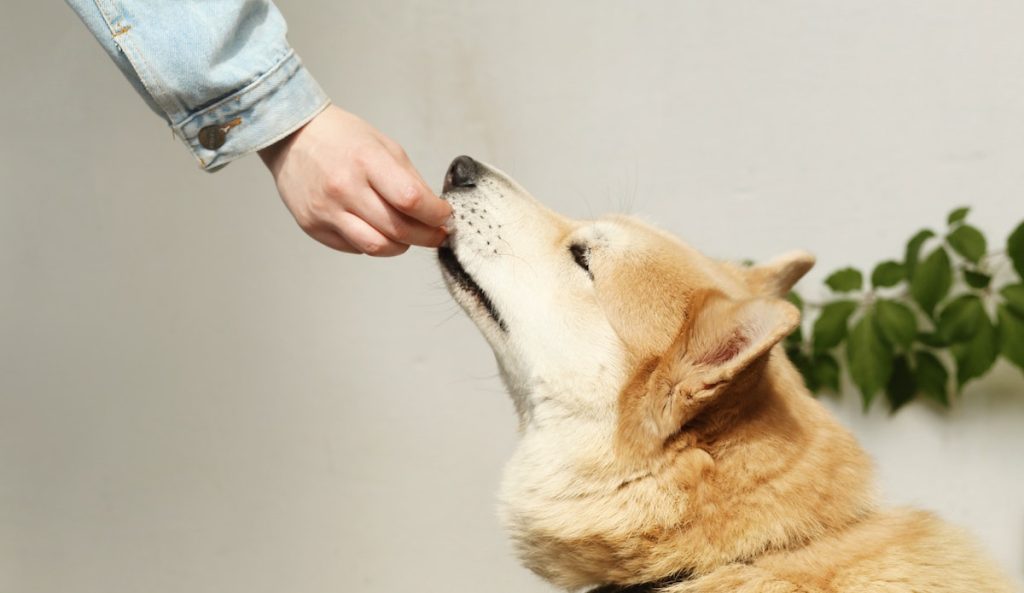If you love to cook, chances are you have a baking family member in the house. However, should your dog be eating cinnamon? You might be wondering can a dogs eat cinnamon. Your dog’s digestive system is not as strong as a human’s and can’t digest certain things like sugar and cinnamon. Cinnamon is often used in recipes to give baked goods a specific, sweet taste. Your dog will most likely experience diarrhea, vomiting, or abdominal pain that could last for days if they consume too much cinnamon. In extreme cases, they may experience liver failure or death!
Table of Contents
How much cinnamon is too much for dogs?
Dogs have a different digestive system than humans and can easily experience stomach issues if they consume too much cinnamon. If you see any of the following symptoms, it is a good idea to take your dog to the vet ASAP. If you suspect your dog has consumed more significant amounts of cinnamon and/or sugar, do not induce vomiting or try to administer any vitamin K, as this could damage their liver. Take them in right away (call before heading in), and they should be okay with some supportive care.
The symptoms of cinnamon ingestion include:
● Vomiting and diarrhea
● Lethargy and weakness (including trouble walking)
● Abdominal pain, or pain when moving the abdomen. The abdomen may be rigid or have a slight tenderness to it.
● Blood in the stools (this is not normal)
These symptoms may or may not be present depending on the dog and the amount ingested. They also vary in severity. If your pet has consumed large amounts of cinnamon, it is likely that it will experience at least some of these symptoms and should be taken to a veterinarian as soon as possible.
What’s safe? What’s toxic?
If your dog has eaten a few teaspoons of cinnamon, it can experience stomach upset but is likely to recover completely within a day or two. If they have eaten more than small amounts (three tablespoons or so would put them over the top), they will likely have trouble recovering. The symptoms of too much cinnamon may include:
● Vomiting and diarrhea
● Lethargy and weakness (including trouble walking)
These are the most common symptoms. They may also experience abdominal pain or pain when moving the abdomen. The abdomen may be rigid or have a slight tenderness to it. This is caused by some of the spices found in cinnamon not being broken down completely in the stomach and going directly into the bloodstream. Hence, it is highly vital for you to know if can dogs have cinnamon. If your dog has eaten more than three tablespoons of cinnamon, it should be taken to the veterinarian and may need IV fluids while they wait for treatment to begin (if possible).
What other products contain cinnamon?
If your dog doesn’t like to eat cinnamon by itself, it may get the urge to lick or chew on the following items:
● Xylitol gum (sugar-free) – Xylitol is a sugar substitute often used in gum. Please do not allow your dog to have any chewing gum! It is entirely unnecessary. Some human foods contain xylitol which can cause a lot of damage to your pet if they get into it. Check the labels on all boxes and cans before you buy them, and make sure there’s no xylitol inside.
● Spicy hot chocolate mix – Some fancy hot chocolate mixtures contain cinnamon flavoring and should not be given to your dog.
● Cinnamon chips (purchased from stores) – May have sugar or another product added. Please keep all snacks away from your pet and make sure all of them are baked!
What can I do to prevent a possible episode of poisoning?
● Make sure there is no xylitol in your dog’s treats or snacks. Store all baked goods safely where your dog cannot get to them.
● Don’t allow them to have chewing gum or spicy hot chocolate mix.
● Make sure there are no cinnamon-flavored products in the foods you prepare.
● Don’t give your dog any treats, food, or spices that you wouldn’t eat yourself.
● Never leave your dog with anything they can harm themselves with while you’re out of the house.
So what can Cinnamon do for my dog?
Cinnamon is often used to help lower blood sugar levels and treat nausea. It is also known to help with arthritis, prevent certain types of cancer and improve insulin response for dogs who suffer from diabetes (known as Type 1, juvenile diabetes).
How can I avoid toxic exposure?
Do not give your dog chewing gum or gum drops that contain cinnamon. Any candy with natural/fake flavorings may contain large amounts of cinnamon (especially around Halloween). It is best to avoid these altogether until you can verify that there is no cinnamon included in their ingredients.
The main ingredient that needs to be avoided is the cinnamon itself. It is better not to use it at all in your recipe. Suppose you do not have a recipe containing cinnamon but have ingested it in any form. In that case, they will likely recover without any treatment (though they may need to be closely monitored after their symptoms begin).
Will my dog need medical treatment?
If your dog has eaten more than three tablespoons of cinnamon, it should be taken to the veterinarian and may need IV fluids while they wait for treatment to begin (if possible). Other forms of treatment are Vitamix vitamin K injection or fluid therapy, for example. They will also likely experience some nausea and vomiting.
Vitamin K injections help treat dogs that have consumed too much sugar in the form of doughnuts or cinnamon rolls. This can be done through IV fluids, but it can be expensive. Medication should only be given to high-risk dogs. If the patient is low risk, they will likely recover without treatment.
What’s next?
Once you know your dog can handle some cinnamon, you should continue to feed it in moderation. If you suspect your pet has ingested more than what is safe, take them to the vet and discuss treatment options. If your dog is at high risk for a severe reaction, it should be admitted to an animal hospital and receive IV fluids, vitamin K injections, or other medications such as acacia.
It is also essential to curb the amount of time your dog has access to cinnamon. Many people will gift their dogs with treats containing cinnamon and sugar that have already been baked and dried. Any treat given to your dog should be eaten immediately!
Will my dog get sick from eating cinnamon? How about my other pets?
Do you want to be able to provide your dog with a safe treatment that is healthy and won’t cause them harm? If you answered yes, then starting the process now will prevent any future problems down the line. To avoid any unpleasant situations like this ever occurring again, you must start applying these precautionary steps now. You do not want your dog accidentally consuming harmful ingredients and forgoing their treatment options. This can cause potentially life-threatening consequences.
A good rule of thumb is no more than one teaspoon of cinnamon per 10 lbs of your dog’s body weight per day. This is an excellent rule to follow. If you have any concerns, your vet can tell you what to look for by performing an exam. If you think your pet has ingested more than this amount, it should be brought to the vet immediately.
The best way to avoid these problems is by using moderation in your choice of treats and snacks for your pets. Give them some cinnamon-free treats, such as those made with healthy ingredients only. This will ensure no unnecessary consequences when feeding them any treat containing cinnamon.
Alex is fascinated with “understanding” people. It’s actually what drives everything he does. He believes in a thoughtful exploration of how you shape your thoughts, experience of the world.

